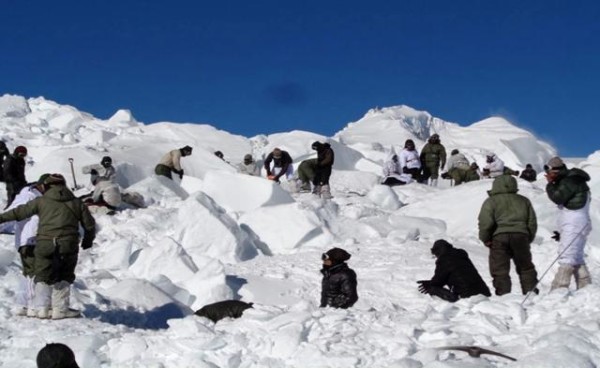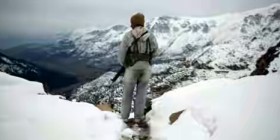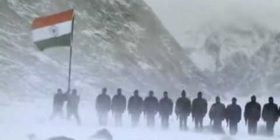To paraphrase Shakespeare, Lance Naik Hanamanthappa Koppad has greatness thrust on him. In his death, Hanamanthappa will probably go down in contemporary history for having rallied the entire nation around the indomitable spirit of soldiers, who refuse to quit even when all experts, logic and sheer common sense advocates otherwise. For that reason alone he has done yeoman service to the nation. But perhaps there should be another reason as well.
There is more awareness about Siachen Glacier and the adversities of our soldiers in the last four days than the past four decades since our troops have been manning those lofty posts. Many more Indians are now aware of at least one sector where our soldiers stand guard–so that we may sleep in peace. But, that is not the whole picture.
Siachen is only a 75-km stretch, of the several thousand that are manned through the fiercest of summers in deserts, drenching jungles in the North East and the sub-zero Himalayan ranges. The number of dead in the glacier veils the fact that several thousand of our soldiers come back from their tours of duty, scarred and broken, physically and mentally. Thousands suffer some form of permanent damage and spend the rest of their truncated lives struggling to get their rightful dues, let alone gratitude of the nation. Beyond the fervour evoked during times of conflict, natural disasters and the perfunctory national celebrations–we don’t look after our serving or retired warriors. Period. And for our own existential imperatives that needs to change before it is too late.
It is sad that as a nation–we are possibly most ignorant about our own country. Naïve debates about ‘demilitarization’ of Siachen in the wake of such instances display the unawareness of geo-security realities. Yes it is a tough place to be in. No one knows it more than soldiers who have to be there. But it is our land, our country. And we are under attack not just in Siachen but all across our boundaries. Belligerent and at times, even purported allies, constantly probe our country’s resolve, military preparedness and political will by intruding our mainland territories like Arunachal Pradesh or our extended frontiers like the Coco Island in the Andaman archipelago or our territorial sea waters and even our airspace. They test it by launching attacks on our airbases and our cities. They test it by mutilating our soldiers and killing innocent civilians.
And what they find ought to be worrying us.
They find us weak in resolve because of our superficial understanding of our own country. Most ‘educated’ Indians would have a hard time locating Siachen or Kargil or the myriad battlefields where we have lost countless lives–on a map. For that matter they would have a hard time locating some of the North-Eastern states! They find us infighting after every attack–with various arms of the national apparatus blaming each other, concealing their ineffectiveness with officialese of ‘due process’ and seeking mileage to further their parochial agendas–rather than presenting a unified front.
They would find our military preparedness feeble after decades of apathy in terms of provisioning of equipment, stagnant modernization plans and declining morale of our forces. They would find the civil – military relationship precarious with troops and junior officers getting increasing disillusioned with the treatment of serving and ex-servicemen. And they would assess our political will to be weak, because these problems never seem to get fixed. Countless reports, recommendations of committees, proclamations of plans of self-reliance, pronouncements of schemes and promises made – flounder, stymied by the ‘system’ which our nation seems to be unable to fix. We are lurching into the future with archaic foundations and mostly everyone knows this and yet whilst they nod their heads in agreement, they rarely do anything more than wallowing in status quo. It takes a Nirbhaya or a Hannumanthappa to remind us of this national apathy but neither of them can substitute the ownership each of us needs to take of our country, our destiny and our legacy. One and half billion people cannot outsource patriotism to one and half million soldiers and consider themselves absolved of their responsibilities.
We need to get to know our country better. Its boundaries, its security challenges, its geo-political nuances. We must know where our soldiers are dying and why they are dying there. We must stop blaming our education system which shrouds national security issues and kindle curiosity within ourselves. We must demand to know why our troops are ill equipped, why our units are languishing without critical equipment. We must address the root cause of shortages of officers in the armed forces. We must question our leaders and penalize their prevarication. We must leverage our democratic rights to the fullest because this democracy and freedom is not free. Soldiers pay for it in blood. And we must personally thank every soldier we come across–as individuals. And try our best to rehabilitate them as organisations. If we genuinely mean to honor Hanamanthappa and his countless comrades, then we should discharge our duties as citizens like our soldiers discharge theirs as soldiers. And if Hanamanthappa could galvanise our collective conscience to do that – he would have gone way beyond call of duty – as indeed soldiers usually do.
The author is former CEO NATGRID –Views expressed are personal.






Leave a reply